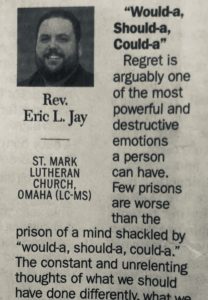Omaha Herald – “From the Pulpit” – February 8, 2020

Pastor Jay is a regular contributor to the Omaha Herald’s “From the Pulpit” op-ed section that is published in the Saturday edition of the Herald. About every 3 months Pastor published an article. Here is the latest article that was in the December 7th edition of From the Pulpit.
“Would-a, Should-a, Could-a”
Regret is arguably one of the most powerful and destructive emotions a person can have. Few prisons are worse than the prison of a mind shackled by “would-a, should-a, could-a.” The constant and unrelenting thoughts of what we should have done differently, what we could have done instead, and what would have been, are no less isolating and punishing than solitary confinement.
Created by God, we all have a conscience that knows there is right and wrong, that we should live rightly, and even if we have tried to bury it and hide it from ourselves, we know in the deepest parts of our soul that we are not as we should be, that the world is not as it should be, and that we cannot fix ourselves. Unattended regret can result in especially destructive thoughts and behaviors that attempt to make it all just “go away.” Unfortunately, denial or the attempt to disguise regret only amplifies its reality.
The only way to live truly free of regret is to repent. The Bible says in 2 Corinthians 7:9-10, “Godly grief produces a repentance that leads to salvation without regret, whereas worldly grief produces death.” We can and should always apologize to those we wrong and hurt with our sin, but our hearts and souls will not find everlasting peace and rest until we are reconciled to the One whom we first offend with our sin. “Against you, God, and you only, have I sinned and done what is evil in your sight.” – Psalm 51:4.
Like you and I, King David was no stranger to sin and regret. In Psalm 32, David articulates in prayer to God what we all know to be true: “For I know my transgressions, and my sin is ever before me. For day and night your hand was heavy upon me; my strength was dried up as by the heat of summer. But when I acknowledged my sin to you, and I did not cover my iniquity; when I said, ‘I will confess my transgressions to the Lord,’ you forgave the iniquity of my sin.”
Redemption and reformation begin with repentance. Though there is certainly a healthy place for remorse and sorrow over our sins and failures, because of God’s free gift of forgiveness and hope given to us in Jesus Christ, we can be set free of regret. By God’s grace through the confidence of faith alone in Christ’s sufficient sacrifice on the cross that paid the price for our sin and satisfied the wrath of God, God now sees us as He sees His perfect Son Jesus, and we can look back even on the darkest parts of our life and find every reason to look forward full of hope and encouragement.
Pastor and Psychologist Craig D. Lounsbrough rightly said, “Any new beginning is forged from the shards of the past, not from the abandonment of the past.” In His infinite love and mercy, God has not abandoned us because of our past. He has called us to repent, to receive the free gift of His forgiveness in Christ, and be set free from regret to live eternally as the redeemed of God.
